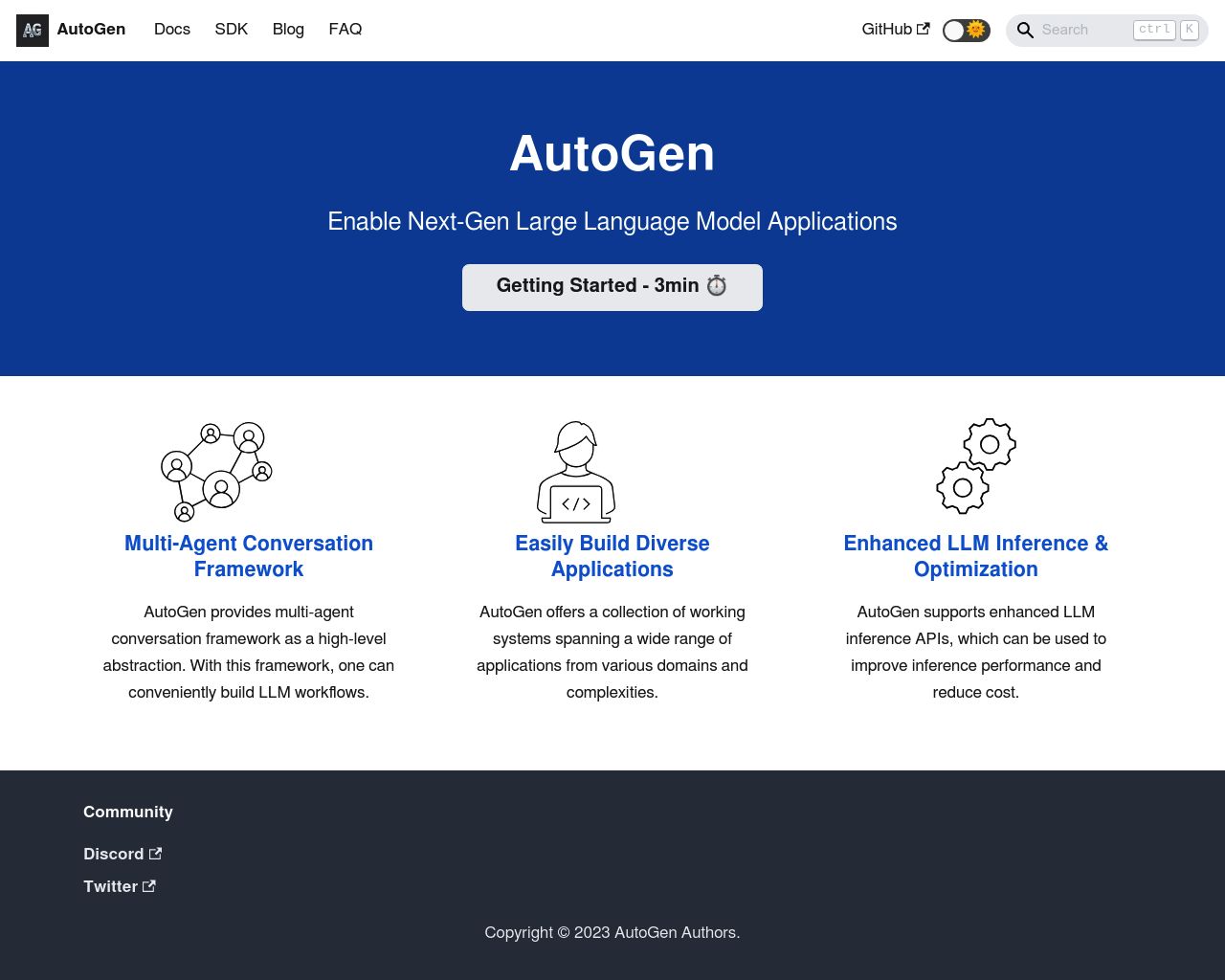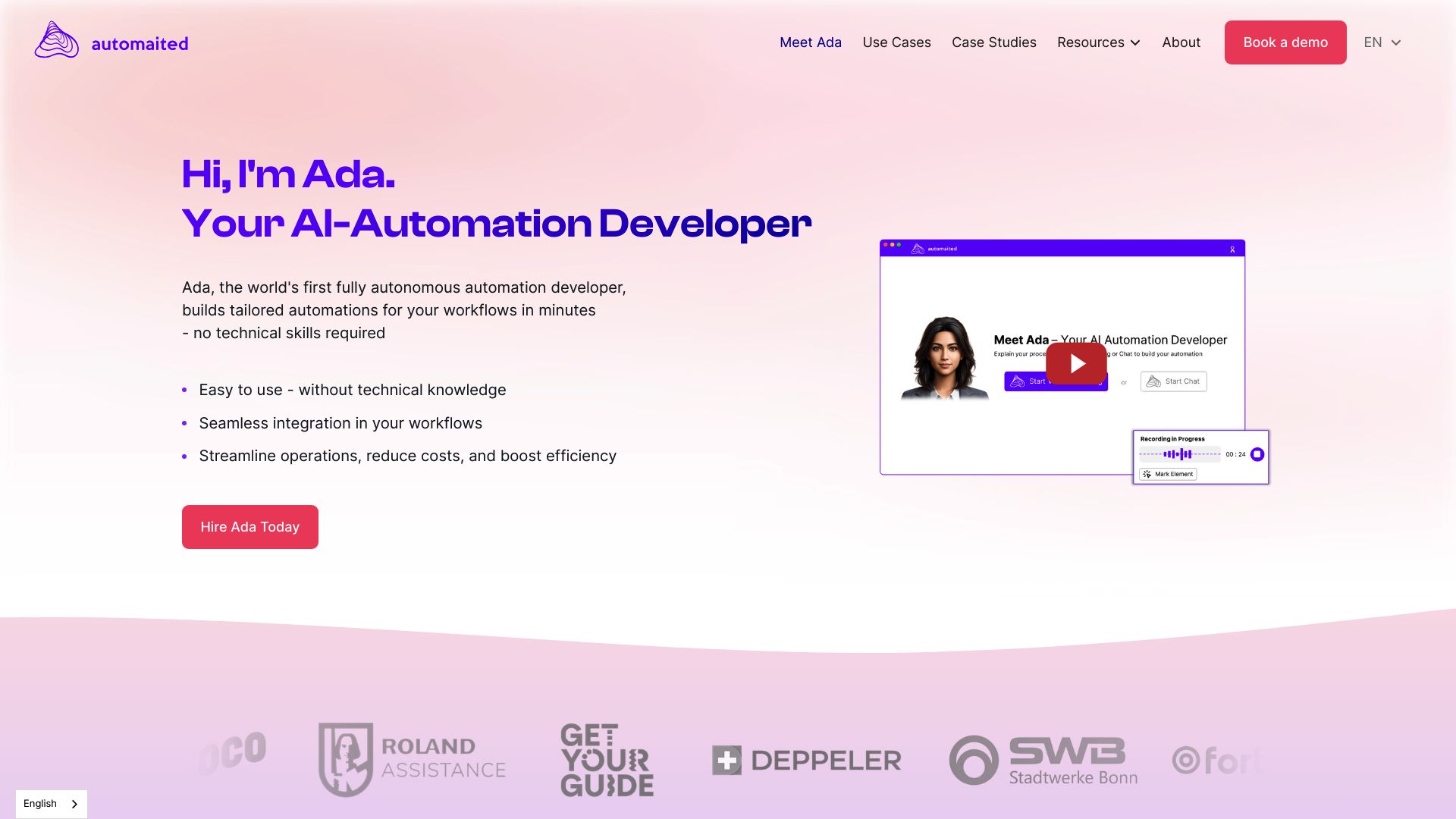AutoGen vs. Automaited: Key Feature Comparison
AI-powered automation revolutionizes business processes, empowering organizations to streamline operations and boost productivity. This comparison delves into AutoGen, Automaited, and SmythOS, three distinct platforms transforming the AI landscape. We examine their unique approaches to agent development, automation capabilities, and user accessibility. Developers will gain insights into API integrations and advanced AI features, while business leaders explore scalability and enterprise-ready solutions. Non-technical users discover user-friendly interfaces and no-code options. By dissecting core functionalities, deployment flexibility, and integration ecosystems, this review equips readers to select the ideal AI platform for their specific needs, whether building sophisticated applications or simplifying everyday tasks.
AutoGen Overview
AutoGen empowers developers to create sophisticated Large Language Model (LLM) applications through multi-agent conversations. The framework enables customizable agents to interact with each other, LLMs, tools, and humans to tackle complex tasks.


AutoGen’s core strength lies in facilitating autonomous multi-agent conversations. These agents collaborate to perform tasks independently or with human input, adapting to various use cases. The framework maximizes LLM performance through enhanced inference capabilities, including tuning, caching, error handling, and templating.
AutoGen empowers developers to create sophisticated Large Language Model (LLM) applications through multi-agent conversations.
Developers can tailor agents to specific task requirements, integrating LLMs, human inputs, and tools. AutoGen supports both fully autonomous operations and human-in-the-loop problem-solving, offering flexibility for applications where human oversight is crucial.
The framework demonstrates effectiveness across diverse applications, from automated task solving and code generation to continual learning and complex problem-solving in group chats. AutoGen provides debugging tools and logging functionalities for API calls, essential for optimizing LLM-based systems.
AutoGen supports both fully autonomous operations and human-in-the-loop problem-solving, offering flexibility for applications where human oversight is crucial.
While AutoGen offers powerful capabilities, it requires coding knowledge for setup and lacks a visual builder or no-code editor. This limitation may pose challenges for users without programming expertise. Additionally, the framework’s focus on code-based configuration might impact the learning curve for those new to AI development.
Automaited Overview
Automaited transforms business process automation with its AI-powered platform. Designed for both technical and non-technical users, Automaited streamlines data transfer, content generation, and information processing across over 1000 applications.
Automaited excels in simplifying complex workflows through natural language interactions. Users create automations by conversing with AI, eliminating the need for coding skills. The platform generates smart buttons for one-click execution of repetitive tasks, seamlessly integrating into existing systems.
Users create automations by conversing with AI, eliminating the need for coding skills.


Key features include automated data transfer between ERP, CRM, and communication platforms, AI-driven text generation for emails and reports, and intelligent data comparison tools. Automaited also offers content summarization capabilities, enhancing information processing efficiency.
The platform prioritizes accessibility and security. Its user-friendly interface caters to non-technical professionals, while GDPR compliance ensures data protection. However, Automaited lacks some advanced features found in other AI agent builders, such as a visual workflow builder or extensive debugging tools.
Automaited positions itself as a solution for businesses seeking to improve productivity without extensive technical resources. While it may not offer the depth of customization that developers require, its focus on intuitive automation and broad application support makes it a compelling choice for small to medium enterprises looking to streamline their operations efficiently.
Feature Comparison
AutoGen and Automaited offer distinct approaches to AI agent development, with notable feature gaps in core components and security. AutoGen excels in providing a flexible framework for multi-agent conversations and customizable workflows. Its strength lies in enabling developers to create sophisticated Large Language Model applications through code-based configurations. AutoGen supports autonomous agent operations, multi-agent collaboration, and integration with various APIs and tools.
In contrast, Automaited focuses on simplifying business process automation through natural language interactions. It provides a more accessible platform for non-technical users to create automations without coding skills. Automaited’s strength is in its user-friendly interface and broad application support, making it suitable for small to medium enterprises looking to streamline operations efficiently.
AutoGen offers more advanced debugging tools and logging functionalities, which are crucial for optimizing Large Language Model-based systems. It also provides greater flexibility in customizing agent behaviors and interactions. However, Automaited surpasses AutoGen in terms of ease of use for non-technical users, offering natural language-based automation creation and smart buttons for one-click execution of tasks. AutoGen lacks a visual builder or no-code editor, which Automaited provides, making it more accessible to a wider range of users.
Feature Comparison Table
| AutoGen | Automaited | SmythOS | |
|---|---|---|---|
| CORE FEATURES | |||
| Hosted Agents (Dev, Production) | ✅ | ❌ | ✅ |
| Environments (Dev, Production) | ✅ | ❌ | ✅ |
| Visual Builder | ❌ | ❌ | ✅ |
| No-Code Options | ❌ | ✅ | ✅ |
| Debug Tools | ✅ | ❌ | ✅ |
| Multimodal | ✅ | ❌ | ✅ |
| Multi-Agent Collaboration | ✅ | ❌ | ✅ |
| Audit Logs for Analytics | ✅ | ❌ | ✅ |
| Agent Work Scheduler | ❌ | ✅ | ✅ |
| SECURITY | |||
| Constrained Alignment | ❌ | ❌ | ✅ |
| OAuth | ✅ | ❌ | ✅ |
| IP Control | ❌ | ❌ | ✅ |
| COMPONENTS | |||
| Foundation AIs | ✅ | ❌ | ✅ |
| Huggingface AIs | ✅ | ❌ | ✅ |
| Zapier APIs | ✅ | ❌ | ✅ |
| Classifiers | ✅ | ❌ | ✅ |
| Data Lakes | ❌ | ❌ | ✅ |
| DEPLOYMENT OPTIONS (EMBODIMENTS) | |||
| Deploy as API | ✅ | ❌ | ✅ |
| Deploy as Webhook | ✅ | ❌ | ✅ |
| Staging Domains | ❌ | ❌ | ✅ |
| Production Domains | ❌ | ❌ | ✅ |
| API Authentication (OAuth + Key) | ✅ | ❌ | ✅ |
| Deploy as Site Chat | ✅ | ❌ | ✅ |
| Deploy as Scheduled Agent | ❌ | ❌ | ✅ |
| Deploy as GPT | ✅ | ❌ | ✅ |
| DATA LAKE SUPPORT | |||
| Hosted Vector Database | ❌ | ❌ | ✅ |
| Sitemap Crawler | ❌ | ❌ | ✅ |
| YouTube Transcript Crawler | ❌ | ❌ | ✅ |
| URL Crawler | ✅ | ❌ | ✅ |
Conclusion
AutoGen, Automaited, and SmythOS each offer unique approaches to AI-powered automation, catering to different user needs and technical expertise levels. AutoGen excels in providing a flexible framework for developers to create sophisticated LLM applications through multi-agent conversations. Automaited simplifies business process automation with its natural language interface, making it accessible to non-technical users. However, SmythOS emerges as the superior choice, combining the strengths of both while addressing their limitations.
SmythOS stands out with its comprehensive feature set, including a visual drag-and-drop interface, extensive integration ecosystem, and versatile deployment options. Unlike AutoGen, which requires coding knowledge, SmythOS democratizes AI development with its no-code approach. It surpasses Automaited in advanced capabilities, offering multi-agent orchestration, customizable workflows, and support for a wide range of AI models and APIs.
The platform’s “Create Once, Deploy Anywhere” philosophy sets it apart, allowing users to build agents that seamlessly integrate into multiple environments. This flexibility, combined with SmythOS’s robust security measures, scalability, and enterprise-ready features, makes it an ideal solution for businesses of all sizes looking to harness the power of AI.
If you’re ready to revolutionize your workflow with AI-powered automation, explore our diverse range of AI-powered agent templates to jumpstart your journey. For those eager to experience the full potential of SmythOS, we invite you to create a free SmythOS account and start building unlimited AI agents at no cost. Discover how SmythOS can transform your business processes and drive innovation in ways you never thought possible.
Last updated:
Disclaimer: The information presented in this article is for general informational purposes only and is provided as is. While we strive to keep the content up-to-date and accurate, we make no representations or warranties of any kind, express or implied, about the completeness, accuracy, reliability, suitability, or availability of the information contained in this article.
Any reliance you place on such information is strictly at your own risk. We reserve the right to make additions, deletions, or modifications to the contents of this article at any time without prior notice.
In no event will we be liable for any loss or damage including without limitation, indirect or consequential loss or damage, or any loss or damage whatsoever arising from loss of data, profits, or any other loss not specified herein arising out of, or in connection with, the use of this article.
Despite our best efforts, this article may contain oversights, errors, or omissions. If you notice any inaccuracies or have concerns about the content, please report them through our content feedback form. Your input helps us maintain the quality and reliability of our information.
